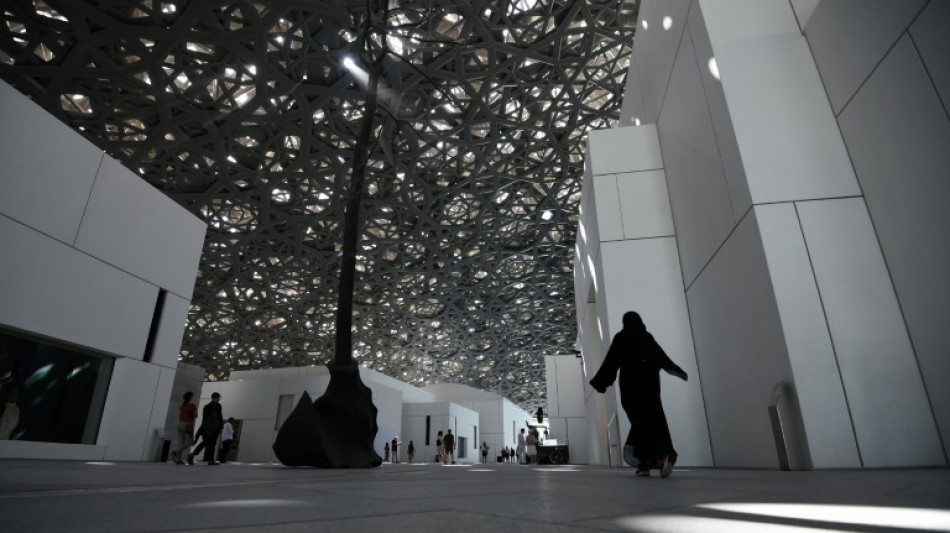
-
 China consumption slump deepens as February prices drop
China consumption slump deepens as February prices drop
-
'Things are different' Djokovic says after another early exit at Indian Wells

-
 Colombian guerillas release hostage security forces
Colombian guerillas release hostage security forces
-
France lose Dupont but Six Nations title on the cards after thrashing Ireland

-
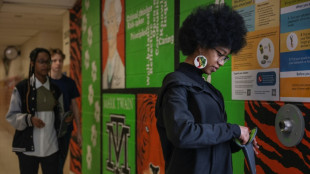 Phone bans sweep US schools despite skepticism
Phone bans sweep US schools despite skepticism
-
Did Ukraine have to become a partisan US issue?

-
 Djokovic crashes out of Indian Wells opener
Djokovic crashes out of Indian Wells opener
-
Britain's King Charles calls for unity in 'uncertain times'

-
 Morikawa seizes lead at Arnold Palmer after birdie rally
Morikawa seizes lead at Arnold Palmer after birdie rally
-
Alcaraz, Keys breeze into Indian Wells third round

-
 Record-setting Skotheim claims European indoor heptathlon title
Record-setting Skotheim claims European indoor heptathlon title
-
Inter survive Monza scare to extend Serie A lead

-
 Argentina port city 'destroyed' by massive rainstorm, 13 dead
Argentina port city 'destroyed' by massive rainstorm, 13 dead
-
Townsend relishing 'toughest fixture' in France after Scotland's Six Nations win over Wales

-
 Colombian guerillas release hostage security forces: AFP
Colombian guerillas release hostage security forces: AFP
-
Some 200 detained after Istanbul Women's Day march: organisers

-
 Draper sends Brazilian sensation Fonseca packing at Indian Wells
Draper sends Brazilian sensation Fonseca packing at Indian Wells
-
Man with Palestinian flag scales London's Big Ben clock tower

-
 Protesters rally on International Women's Day, fearing far right
Protesters rally on International Women's Day, fearing far right
-
Australian Open champion Keys cruises into Indian Wells 3rd round

-
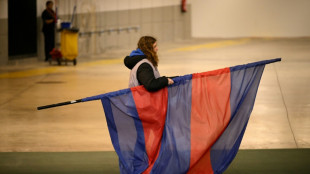 Barca Liga match postponed after club doctor dies
Barca Liga match postponed after club doctor dies
-
Alldritt revels in 'historic' French performance to thrash Irish

-
 Watkins haunts Brentford to revive Aston Villa's top-four hopes
Watkins haunts Brentford to revive Aston Villa's top-four hopes
-
Pulisic double rescues AC Milan at lowly Lecce

-
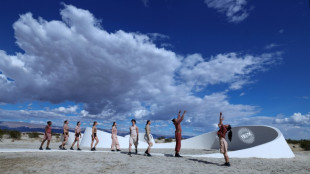 Mirrors, marble and mud: Desert X returns to California
Mirrors, marble and mud: Desert X returns to California
-
'Grieving': US federal workers thrown into uncertain job market

-
 Slot blast fuelled Liverpool's comeback against Southampton
Slot blast fuelled Liverpool's comeback against Southampton
-
Russell back in the groove as Scotland see off Wales in Six Nations

-
 Remains of murdered Indigenous woman found at Canada landfill
Remains of murdered Indigenous woman found at Canada landfill
-
French throng streets for International Women's Day rallies

-
 Security forces taken hostage by Colombian guerillas released: AFP
Security forces taken hostage by Colombian guerillas released: AFP
-
Pope responding well to pneumonia treatment, Vatican says

-
 France coach Galthie 'angry' at Dupont knee injury
France coach Galthie 'angry' at Dupont knee injury
-
The French were clinical, we were not, says Irish coach Easterby

-
 Sleeping man is struck by train in Peru but survives
Sleeping man is struck by train in Peru but survives
-
Dembele hits double as PSG win ahead of Liverpool return

-
 Bosnia top envoy backs court ruling against separatist laws
Bosnia top envoy backs court ruling against separatist laws
-
Bayern get away with shock loss as Leverkusen fall to defeat

-
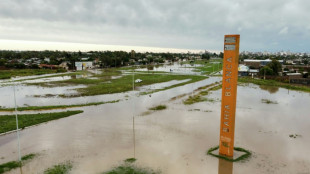 'We have to rebuild a city,' Argentine official says after storm kills 10
'We have to rebuild a city,' Argentine official says after storm kills 10
-
Guardiola urges troubled Man City to fight for Champions League place

-
 Salah fires Liverpool 16 points clear, Forest beat Man City
Salah fires Liverpool 16 points clear, Forest beat Man City
-
Liverpool fight back to go 16 points clear as title moves closer

-
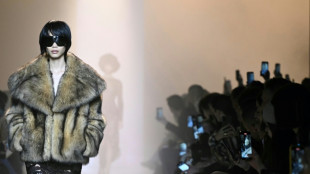 Hermes celebrates felt at Paris Fashion Week
Hermes celebrates felt at Paris Fashion Week
-
Bayern unpunished for shock loss as Leverkusen fall to defeat

-
 Majestic France destroy Irish Six Nations Grand Slam dreams
Majestic France destroy Irish Six Nations Grand Slam dreams
-
Santner wants New Zealand to keep 'open mind' for Champions Trophy final

-
 Pogacar remounts after fall and charges to Strade Bianche win
Pogacar remounts after fall and charges to Strade Bianche win
-
Negri wants Italy to 'make things right' against England in Six Nations

-
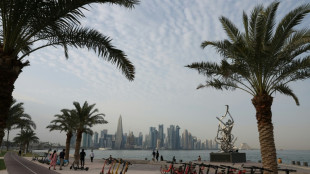 Attack on Iran nuclear plant would leave Gulf without water, Qatar PM warns
Attack on Iran nuclear plant would leave Gulf without water, Qatar PM warns
-
Mitchell backs Dingwall to be England rugby's answer to Rodri


The 'predatory' global economy of looted antiquities
The charging of the Louvre's former director in an antiquities trafficking investigation has shone a light on a vast, transnational criminal problem that remains fiendishly difficult to target.
Ancient burial grounds around the world have increasingly become "open-air supermarkets" for everyone from petty thieves to organised criminals, said Vincent Michel, professor of archaeology at the University of Poitiers in France.
He describes a "sophisticated chain" stretching from sites in unstable places such as Iraq, Syria and Libya -- but also many other parts of the world -- via transit countries to auction houses and private collectors in Europe and the United States, and increasingly Asia and the Gulf.
It is an illicit trade that "serves mafias, drug traffickers and terrorist groups, abusing collectors and museums with complete impunity", said Michel.
The ex-director of the Louvre in Paris, Jean-Luc Martinez, was charged last week over the purchase of a pink granite stele depicting the pharaoh Tutankhamun and four other historic works for eight million euros ($8.5 million) by the museum's branch in Abu Dhabi.
Martinez, who has strongly denied any wrong-doing, is accused of turning a blind eye to fake certificates of origin for the pieces, a fraud thought to involve several other art experts, according to French investigative weekly Canard Enchaine.
Such allegations are far from a rarity in the art world where the value of looted antiquities is thought to reach into the "tens or even hundreds of millions of euros" per year, according to Michel.
He trains police, judges and customs officials to help counter the trade but resources are notoriously limited in the sector, and he has called for deeper public awareness and a more concerted interdisciplinary fight.
"This transnational crime feeds a predatory economy that undermines our national security. It is also an irreversible attack on heritage because a looted object, taken out of its context, loses all scientific value," Michel said.
- Global reach -
The Covid-19 pandemic has only deepened the challenge.
Egyptian authorities say the number of illegal digs jumped massively in recent years to hit 8,960 in 2020.
Looters use metal detectors to hunt gold, silver and bronze items, often stored in perfect condition in tombs thanks to the arid climate.
But the problem is not limited to poorer countries.
France has seen an uptick in looting from archaeological sites, said Xavier Delestre, who works for the regional cultural authorities based in Marseilles.
He said high-value items were often laundered through so-called "freeports" -- tax haven storage sites with minimal oversight in places like Geneva, Luxembourg and Singapore -- emerging with false back-stories.
Lower-value items ended up on social media and online stores.
- 'Almost undetectable' -
Michel said counterfeiters are "incredibly ingenious" when it comes to masking the illicit origin of items, creating documents with a careful mix of false and true information, fabricating false export permits or purchase invoices -- even UNESCO certificates.
Once reintroduced into the legal market, "a looted item is almost undetectable," he added.
Internet sales have made it even harder for law enforcement officials to trace criminals and keep a handle on the problem.
A 2019 report by US counter-trafficking organisation ATHAR tracked 95 Arabic-language Facebook groups specialising in antiquities trafficking, with a total of nearly two million members.
"Facebook offers a veritable digital toolbox for traffickers to utilise, including photo and video uploads, live streaming, disappearing 'Stories', payment mechanisms, and encrypted messaging," the report said.
A.Jones--AMWN